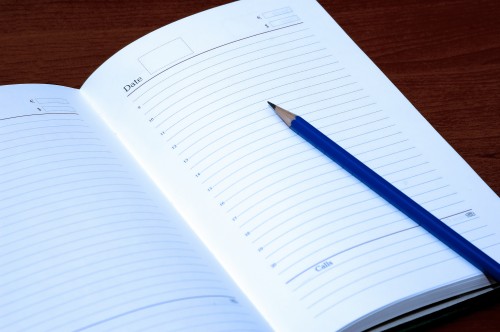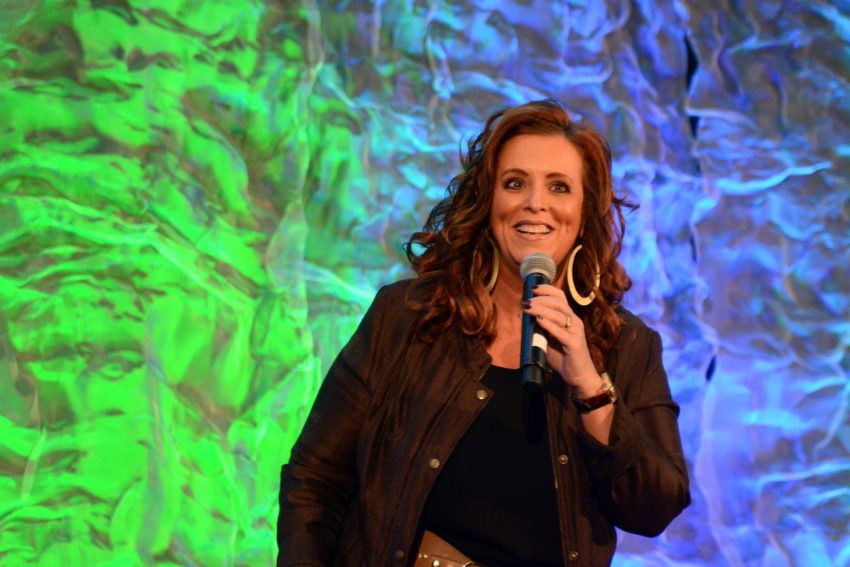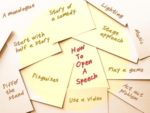Last updated on January 22nd, 2019 at 02:09 pm
How can I remember ALL THAT?
The number one thing that impresses my audiences most (other than how big I can get my hair) is how I remember all the words. My speeches can run anywhere from forty-five minutes to two hours, and often I will do it all without notes. I have stories, comedy bits, poems, silly songs, points, and life lessons – all scripted out in advance. I memorize everything, then practice telling it like it wasn’t memorized. I’ve been doing this for years, so it comes quite easily to me now. But when I coach speakers, and help them put together their own speech, they are often overwhelmed at the idea of memorizing it all. So here are some tips to get you started.
1. Don’t memorize it.
If you can’t remember it all, don’t rely on your memory. You will bomb on stage and you and your audience will be miserable. If you can’t memorize it, bring notes. Period. End of story. Just please don’t read your speech. The audience hates being read to. So instead of memorizing it, read it over and over and over and over. Do this enough, and you won’t have to read it word for word. You’ll know a lot of it already. Put your notes on a podium, or put your notes in a three-ring black binder and bring a music stand. Just turn the pages as you go. The audience will not care. I think it’s better for you not to stand behind the podium. But that’s a lesson for another day.
2. Always try to memorize as much as you can – especially the stories and the comedy bits, and powerful phrases and life lessons.
You went to a lot of trouble to write a powerful phrase – so learn it. Having these pieces memorized and part of your language, will keep you from rambling. And they make nice clips for when you are interviewed on radio or TV and only have a moment or two.
3. Have an outline of your speech that is short and easy to follow and remember.
Having an outline that you can look at, will help you stay on task. There’s nothing worse than a speaker who loses her place and can’t figure out where to go from here. With an outline, you always know where you are going and where you’ve been. Don’t make the outline complicated. I don’t even use complete sentences in my outline. I want to be able to see it clearly and on one page. If I am using notes, I will put the outline to the side where I can see it even when I turn the page.
4. Be able to tell me about your speech.
Before you learn your speech, be able to tell us (the mirror really) about your speech. Describe each component of your speech. Don’t use complete sentences – just an overview. This is kind of like storyboarding, but with no visuals. This really cements the progression of points you make in your speech. If you don’t have a clear idea of the outline, you have a problem with your speech. Another lesson for another day. Get a friend and ask them if you can tell them what your speech is about – piece by piece. Again – just broad strokes.
5. Memorize the beginning and end first.
These are the most important moments of your speech and they matter most. If you can memorize anything, memorize these moments. You don’t want to ease into a speech with chatter and rambling – you want to jump in. And you don’t want to meander out – you want to jump out with a bang.
6. Write your story in a way that makes it easier to memorize.
Don’t make your story too complicated to remember. I once wrote a story that took place in a beauty pageant, and I had a row of characters – the women in the pageant. In order to remember them easily, I put each name in alphabetical order. It made it MUCH easier to memorize and know who was next, and the audience never had a clue.
7. Memorize the speech one line at a time.
Sounds basic, but that’s how you memorize a speech. One line at a time. Say it over and over and over until you have it. Then move on to the second line. Learn it. Now say the first two lines over and over and over. Wash, rinse, and repeat until you have memorized the whole thing.
8. Practice it out of order.
Practice jumping to different parts of your speech and starting there.
9. Learn to recite it really fast.
My actor friend taught me this. It’s something they often do with scripts. Learn to say it at top speed. This is an AWESOME way to really get that story in your brain.
10. Don’t stress if you lose your place.
If I forget where I am, I just laugh and tell the audience that just forgot where I was. Sometimes I tell them I need to start over. Sometimes I ask them if they knew where I was going with that. They love it. Just confess and find your place. It’s not the end of the world. Much better to be honest and real than try to fake your way through.
So there you go. My basic tips for memorizing a speech. If you still have questions, let me know!
Your funny motivational speaker,
Kelly Swanson
fbcomments]
Kelly Swanson is an award-winning storyteller, comedian, motivational speaker, Huffington Post Contributor, and cast member of The Fashion Hero television show airing on Amazon Prime. She is also the author of Who Hijacked My Fairy Tale, The Land of If Only, The Story Formula, and The Affirmation Journal for Positive Thinking. She was a featured entertainer for Holland America Cruise Lines, keynote speaker for the International Toastmasters Convention, and has keynoted major conferences and corporate events from coast to coast. She just launched her one-woman show Who Hijacked My Fairy Tale in theaters, and it is being booked all over the country. In July of 2022, she was inducted into the National Speakers Association Speaker Hall of Fame.
Note: Articles by Kelly may contain affiliate links and may be compensated if you make a purchase after clicking on an affiliate link.





